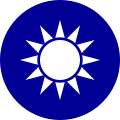| Additional Articles of the Constitution of the Republic of China | |
|---|---|
| Overview | |
| Original title | 中華民國憲法增修條文 |
| Jurisdiction | Free area of the Republic of China |
| Ratified | 22 April 1991 |
| Date effective | 1 May 1991 |
| System | Unitary semi-presidential republic |
| Government structure | |
| Branches | Five (Executive, Legislative, Judicial, Examination, Control) |
| Head of state | President |
| Chambers | Unicameral (Legislative Yuan) |
| Executive | Executive Yuan led by the Premier |
| Judiciary | Judicial Yuan |
| Federalism | Unitary |
| Electoral college | No |
| History | |
| First legislature | |
| First executive | May 20, 1996 (President) |
| Amendments | 7 |
| Last amended | June 10, 2005 |
| Commissioned by | National Assembly |
| Signatories | 457 of the 583 remaining delegates, in Taipei (most delegates elected in 1947, with some elected in 1969 and 1986) |
| Supersedes | Temporary Provisions against the Communist Rebellion and most articles of the original Constitution of the Republic of China |
| Additional Articles of the Constitution of the Republic of China | |||||||||||||||||||||||||||
|---|---|---|---|---|---|---|---|---|---|---|---|---|---|---|---|---|---|---|---|---|---|---|---|---|---|---|---|
| Traditional Chinese | 中華民國 憲法 增修條文 | ||||||||||||||||||||||||||
| Simplified Chinese | 中华民国 宪法 增修条文 | ||||||||||||||||||||||||||
| |||||||||||||||||||||||||||
| This article is part of a series on |
 |
|---|
The Additional Articles of the Constitution of the Republic of China are the revisions and amendments to the original constitution of the Republic of China to "meet the requisites of the nation prior to national unification", taking into account the democratic reforms and current political status of Taiwan. The Additional Articles are usually attached after the original constitution as a separate document. It also has its own preamble and article ordering different from the original constitution. [1]
The Additional Articles has been part of the fundamental law of the present government of the Republic of China on Taiwan since 1991, and were last amended in 2005. The Additional Articles will sunset in the event the Republic of China regains control of the Mainland Area.
